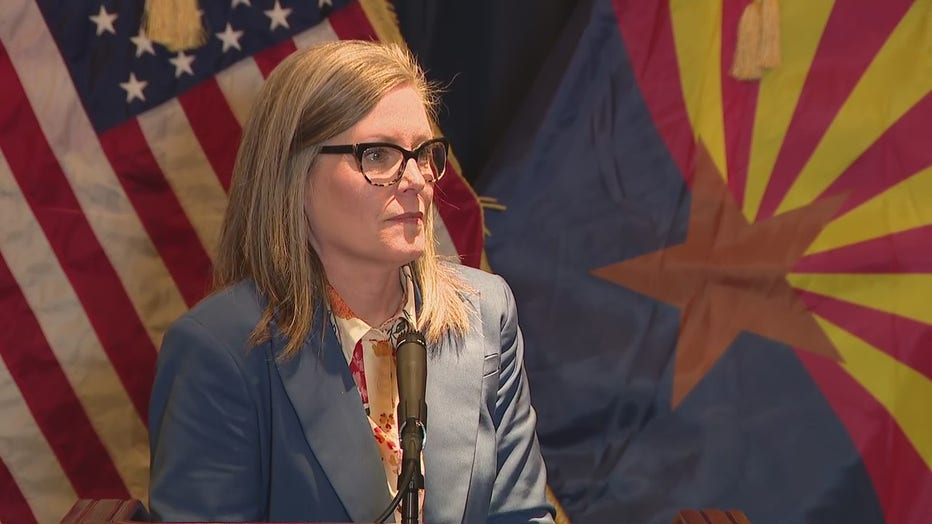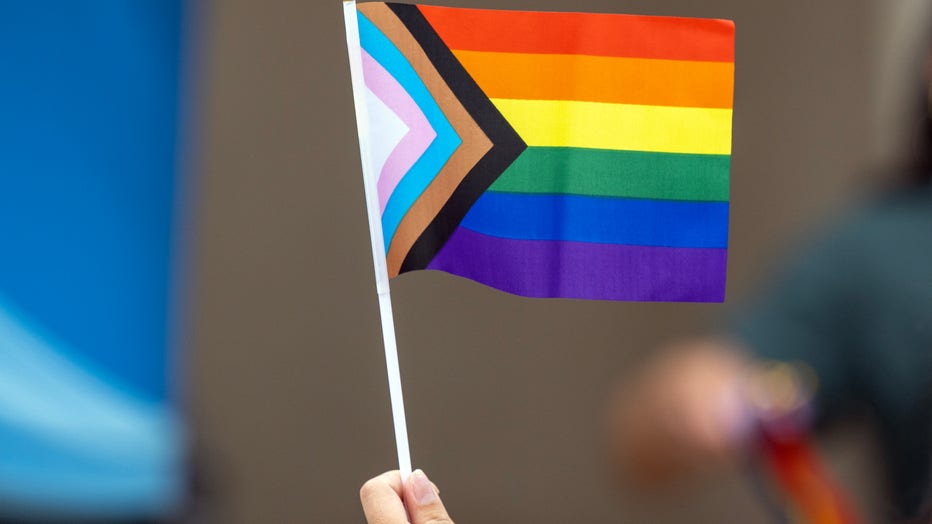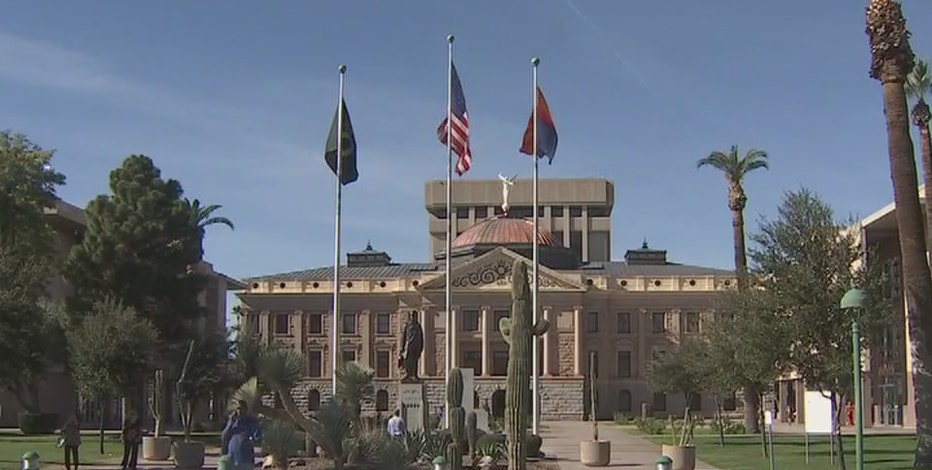Gov. Hobbs signs executive orders on gender-affirming healthcare and conversion therapies: Here's what to know
PHOENIX - On June 27, officials with Arizona Governor Katie Hobbs' office announced that the governor has signed two executive orders that relates to issues faced by the state's LGBTQ+ community.
"Our LGBTQ+ community should never have to face hate and discrimination, and I will do everything in my power to fight for full equality," said Gov. Hobbs, in a statement. "The State is leading by example on this issue, and we will continue working until Arizona is a place where every individual can participate equally in our economy and our workforce without fear of discrimination or exclusion."
Here's what you should know about the two executive orders.
What do the executive orders cover?

Governor Katie Hobbs
The executive orders, according to a statement from the Governor's Office, deal with matters related to "medically necessary gender-affirming healthcare" and conversion therapy.
What will the first executive order do?
The first executive order, officially known as Executive Order 2023-12, would remove an existing exclusion of gender-affirming care from healthcare plans provided to state employees and those who retired from the state government "as soon as practicable, and in compliance with State law."
According to the executive order, gender reassignment surgery, even in cases where the surgery is medically necessary, has been excluded from state healthcare plan coverage since 2017.
In the executive order, Gov. Hobbs stated that the exclusion, among other things:
- Was "not consistent with the covered offered by the State's health insurance carriers' standard benefit packages"
- May conflict with requirements set forth in the federal government's Mental Health Parity Act, "to the extent that the exclusion limits coverage for certain services associated with gender-affirming care but provides coverage for those same services in other contexts"
- Was the target of a 2019 lawsuit against Arizona, which alleged the exclusion violates a provision within the federal government's Civil Rights Act of 1964, as well as violating the 14th Amendment of the U.S. Constitution
Gov. Hobbs also noted that there have been successful legal challenges to exclusions of gender-affirming care in public employee healthcare plans in other states, including Alaska and North Carolina.
In addition, Gov. Hobbs wrote in the executive order that "to the extent permissible under Arizona and federal law," her administration will decline any requests from the executive authority of another state for the "arrest, surrender, or extradition fo any person charged with a criminal violation of a law where the alleged violation relates to the provision of, assistance with, securing of, or receipt of gender-affirming healthcare," unless the alleged act is also punishable as a criminal offense under Arizona law.
The executive order also lists the criteria that allows a care to be identified as "medically necessary," under the current terms of the state's self-funded healthcare plan.
What about the second executive order? What will it do?
The second executive order, officially known as Executive Order 2023-13, requires that state agencies not use state or federal resources to "promote, support, or enable any practice or treatment on minors known to be a form of ‘conversion therapy,’ including authorizing funds to reimburse for medical or mental healthcare known to be in connection with the practice of ‘conversion therapy’ on minors," to the greatest extent allowed under law.
The executive order also gives various state agencies a task of developing and and implementing policies, as necessary and consistent with state and federal law, to protect "LGBTQ+ minors from harmful medical and mental healthcare services related to ‘conversion therapy.’"
Gender-affirming care? Conversion therapy? What are they?

Gender-affirming care
According to a 2022 article by the Association of American Medical Colleges, gender-affirming care "encompasses a range of social, psychological, behavioral, and medical interventions ‘designed to support and affirm an individual’s gender identity’ when it conflicts with the gender they were assigned at birth."
The AAMC describes itself as a not-for-profit associated founded in 1876, and is dedicated to "transforming health through medical education, health care, medical research, and community collaborations."
"The interventions help transgender people align various aspects of their lives — emotional, interpersonal, and biological — with their gender identity," read a portion of the article.
According to a document published by the U.S. Department of Health and Human Services, gender-affirming care consists of an array of services that can include "medical, surgical, mental health, and non-medical services for transgender and nonbinary people."
Such cares, according to the document, can range from "social affirmation," such as adopting gender-affirming hairstyles, clothing, name, and pronouns, to surgeries.
Transgender medical treatment, according to a March 2023 article published by the Associated Press, typically begins with puberty-blocking medication to temporarily pause sexual development. The idea is to give youngsters time to mature enough mentally and emotionally to make informed decisions about whether to pursue permanent treatment. Puberty blockers may be used for years and can increase risks for bone density loss, but that reverses when the drugs are stopped.
Sex hormones — estrogen or testosterone — are offered next. Dutch research suggests that most gender-questioning youth on puberty blockers eventually choose to use these medications, which can produce permanent physical changes. So does transgender surgery, including breast removal or augmentation, which sometimes is offered during the mid-teen years but more typically not until age 18 or later.
Conversion therapy
Conversion therapy, according to the American Academy of Child & Adolescent Psychiatry, are "interventions purported to alter same-sex attractions or an individual’s gender expression with the specific aim to promote heterosexuality as a preferable outcome."
The AACAP describes itself as an organization with a mission to "promote the healthy development of children, adolescents, and families through advocacy, education, and research, and to meet the professional needs of child and adolescent psychiatrists throughout their careers."
According to a 2021 article published by WebMD, conversion therapy can range from talk therapy to faith-based methods that can be emotional or physical.
"Conversion therapy is sometimes performed by clergy or other spiritual advisers. It may include using anti-gay slurs and prayers. In severe cases, it could also include beating, shackling, food deprivation, and even exorcism," read a portion of the article.
The article states that medicine may be used in some instances, and in extreme cases, "gender-affirming surgeries are done to 'neutralize' sexual orientation."
Why is gender-affirming care considered to be a good thing?
On their website, the American Medical Association wrote that improving access to gender-affirming care is an "important means of improving health outcomes for the transgender population."
"Receipt of gender-affirming care has been linked to dramatically reduced rates of suicide attempts, decreased rates of depression and anxiety, decreased substance use, improved HIV medication adherence and reduced rates of harmful self-prescribed hormone use," read a portion of the website.
According to a document published by the American Psychiatric Association, a lack of gender-affirming interventions is "not a neutral decision" due to the dynamic nature of puberty development.
"Youth often experience worsening dysphoria and negative impact on mental health as the incongruent and unwanted puberty progresses. Trans-affirming treatment, such as the use of puberty suppression, is associated with the relief of emotional distress, and notable gains in psychosocial and emotional development, in trans and gender diverse youth," read a portion of the document.
I've heard that some people have regrets about transitioning, or try to "reverse the transition." Is that true?
According to a March 2023 AP article, evidence of later regret is scant, citing guidelines published in 2022 by the World Professional Association for Transgender health.
Dutch research from several years ago found no evidence of regret in transgender adults who had comprehensive psychological evaluations in childhood before undergoing puberty blockers and hormone treatment.
Some studies suggest that rates of regret have declined over the years as patient selection and treatment methods have improved. In a review of 27 studies involving almost 8,000 teens and adults who had transgender surgeries, mostly in Europe, the U.S and Canada, 1% on average expressed regret. For some, regret was temporary, but a small number went on to have de-transitioning or reversal surgeries, the 2021 review said.
Research suggests that comprehensive psychological counseling before starting treatment, along with family support, can reduce chances for regret and de-transitioning.
As for de-transitioning, the AP article states that research and reports from individual doctors and clinics suggest that de-transitioning is rare. The few studies that exist have too many limitations or weaknesses to draw firm conclusions, said Dr. Michael Irwig, director of transgender medicine at Beth Israel Deaconess Medical Center in Boston.
"My own personal experience is that it is quite uncommon," Irwig said. "I’ve taken care of over 350 gender-diverse patients and probably fewer than five have told me that they decided to de-transition or changed their minds."
Why is conversion therapy considered to be a bad thing?
According to the WebMD article, conversion therapy techniques can impact self-esteem, which can take a significant toll on a person's emotional and physical health. The article also noted that many providers who claim they are qualified to provide conversion therapy are often not licensed as mental health practitioners or medical experts.
In a 2022 document issued by the Minnesota Department of Health, it was noted that at least two studies confirmed an association between children and youth who had experienced conversion therapy and subsequently had increased suicidal ideation and suicide attempts.
On their website, the American Medical Association said the underlying assumption for conversion therapy is that homosexuality and gender nonconformity are mental disorders and that sexual orientation and gender identity can be changed.
"This assumption is not based on medical or scientific evidence. Professional consensus rejects pathologizing homosexuality and gender nonconformity and evidence does not support the efficacy of changing sexual orientation," read a portion of the AMA's website.
The AMA, as well as the American Psychiatric Association and the AACAP, have taken clear stances against conversion therapy.
- AMA: "The AMA opposes the use of "conversion therapy" for sexual orientation or gender identity."
- APA: "APA reaffirms its recommendation that ethical practitioners refrain from attempts to change individuals’ sexual orientation," and "APA recommends that ethical practitioners respect the identities for those with diverse gender expressions."
- AACAP: "The American Academy of Child and Adolescent Psychiatry finds no evidence to support the application of any "therapeutic intervention" operating under the premise that a specific sexual orientation, gender identity, and/or gender expression is pathological."
Why is Gov. Hobbs issuing the executive orders now?

The Progress Pride Flag, which includes the colors of the traditional pride flag, along with colors representing the transgender community, along with brown and black, which represent LGBT communities of color. (Photo by Hans Gutknecht, Los Angeles D
The orders, it should be noted, were issued in June.
According to the Library of Congress, June is considered to be LGBTQ Pride Month in honor of the Stonewall Riots that happened in 1969.
The Stonewall Riots, according to the Encyclopaedia Britannica, were a series of violent confrontations between police and gay rights activists outside a gay bar known as Stonewall Inn in New York City.
The incident reportedly began with nine policemen entering the Stonewall Inn and arresting employees for selling alcohol without a license. Many patrons, according to the Encyclopaedia Britannica, were rough up, and several people were taken into custody for allegedly not wearing at least three articles of gender-appropriate clothing. Riots subsequently took place over the course of five days.
"Many historians characterized the uprising as a spontaneous protest against the perpetual police harassment and social discrimination suffered by a variety of sexual minorities in the 1960s. Although there had been other protests by gay groups, the Stonewall incident was perhaps the first time lesbians, gays, and transgender people saw the value in uniting behind a common cause," read a portion of the Encyclopaedia Britannica entry.
While Pride Parades are held in various parts of the U.S. during the month of June, Phoenix holds its pride parade during parts of the year with cooler weather.
It should also be noted that this is not the first time in 2023 that Gov. Hobbs took action on issued related to the LGBTQ+ community, as she has vetoed a number of bills that some say targets the LGBTQ+ community.
Featured
Dozens of bills vetoed by Arizona Gov. Katie Hobbs: here's a list of her vetoes
From late February to now, Arizona Governor Katie Hobbs has already vetoed dozens of bills that cover a range of issues. Here's a look at what Gov. Hobbs has vetoed, and the reasons why.
What are others saying about the executive orders?
Arizona State Senate President Warren Petersen
Petersen, a Republican, lambasted Gov. Hobbs' order on gender-affirming care, via a tweet on his Twitter account.
"Instead of helping struggling AZ families plagued by inflation, the governor just issued an order for taxpayers to cover the cost of elective, sex reassignment surgeries," read a portion of Petersen's tweet.
Petersen represents the state's 14th Legislative District, which covers a portion of the Southeast Valley, including a portion of Gilbert.
Arizona State House Speaker Ben Toma
On July 3, officials with State House Speaker Toma's office announced that Toma has sent a letter to Gov. Hobbs, urging her to rescind the executive order related to conversion therapies.
In the letter, State House Speaker Toma called the order "very likely unconstitutional," and that the order's definition of conversion therapy is "unprecedented, vague, unintelligible, and unenforceable.
"The far-reaching mandates of your Executive Order also threaten to violate the Parents' Bill of Rights, A.R.S. § 1-602, and Arizonans' constitutional rights, including patients' right to freely speak with their therapists," read a portion of the letter. "Accordingly, to prevent violations of Arizonans' constitutional and statutory rights, costly and unnecessary litigation, and inevitable confusion among Arizona's state agencies, you should immediately rescind executive Order 2023-13."
Planned Parenthood Advocates of Arizona
In a statement, the group's President and CEO, Brittany Fonteno, said the organization applauds Gov. Hobbs "for her commitment to ensuring Arizonans have access to gender-affirming care and protecting all LGBTQ+ Americans who are forced to cross state lines to receive care."


